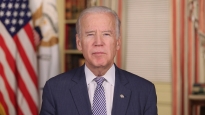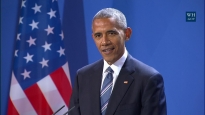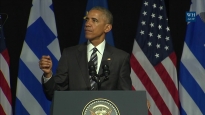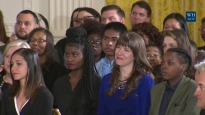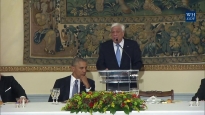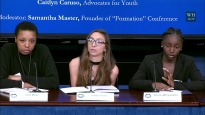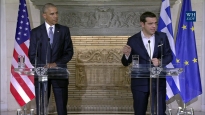President Obama Speaks on Reducing Gun Violence
April 08, 2013 | 32:58 | Public Domain
President Obama continues asking the American people to join him in calling on Congress to pass common-sense measures to reduce gun violence.
Remarks by the President on Reducing Gun Violence -- Hartford, CT
University of Hartford
Hartford, Connecticut
5:45 P.M. EDT
THE PRESIDENT: Hello, Connecticut. (Applause.) Thank you. Well, thank you so much, everybody. Let me begin by thanking Nicole, and Ian, for your brave words. (Applause.) I want to thank them and all the Newtown families who have come here today, including your First Selectman, Pat Llodra. (Applause.) Nobody could be more eloquent than Nicole and the other families on this issue. And we are so grateful for their courage and willingness to share their stories again and again, understanding that nothing is going to be more important in making sure the Congress moves forward this week than hearing from them.
I want to thank all the educators from Sandy Hook Elementary who have come here as well -- (applause) -- the survivors --
AUDIENCE MEMBERS: We love you, Obama!
THE PRESIDENT: I love you back. I do. (Applause.)
-- the survivors who still mourn and grieve, but are still going to work every day to love and raise those precious children in their care as fiercely as ever.
I want to thank Governor Malloy for his leadership. (Applause.) Very proud of him. I want to thank the University of Hartford for hosting us this afternoon. (Applause.) Thank you, Hawks. (Applause.) And I want to thank the people of Connecticut for everything you’ve done to honor the memories of the victims -- (applause) -- because you’re part of their family as well.
One of your recent alumni, Rachel D’Avino, was a behavioral therapist at Sandy Hook. Two alumni of your performing arts school, Jimmy Greene and Nelba Marquez-Greene, lost their daughter, Ana -- an incredible, vibrant young girl who looked up to them, and learned from them, and inherited their talents by singing before she could talk.
So every family in this state was shaken by the tragedy of that morning. Every family in this country was shaken. We hugged our kids more tightly. We asked what could we do, as a society, to help prevent a tragedy like that from happening again.
And as a society, we decided that we have to change. We must. We must change. (Applause.)
I noticed that Nicole and others refer to that day as “12/14.” For these families, it was a day that changed everything. And I know many of you in Newtown wondered if the rest of us would live up to the promise we made in those dark days -- if we’d change, too; or if once the television trucks left, once the candles flickered out, once the teddy bears were carefully gathered up, that the country would somehow move on to other things.
Over the weekend, I heard Francine Wheeler, who lost her son Ben that day, say that the four months since the tragedy might feel like a brief moment for some, but for her, it feels like it’s been years since she saw Ben. And she’s determined not to let what happened that day just fade away. “We’re not going anywhere,” she said. “We are here. And we are going to be here.” And I know that she speaks for everybody in Newtown, everybody who was impacted.
And, Newtown, we want you to know that we’re here with you. We will not walk away from the promises we’ve made. (Applause.) We are as determined as ever to do what must be done. In fact, I’m here to ask you to help me show that we can get it done. We’re not forgetting. (Applause.)
We can't forget. Your families still grieve in ways most of us can’t comprehend. But so many of you have used that grief to make a difference -- not just to honor your own children, but to protect the lives of all of our children. So many of you have mobilized, and organized, and petitioned your elected officials “with love and logic,” as Nicole put it -- as citizens determined to right something gone wrong.
And last week, here in Connecticut, your elected leaders responded. The Connecticut legislature, led by many of the legislators here today, passed new measures to protect more of our children and our communities from gun violence. And Governor Malloy signed that legislation into law. (Applause.)
So I want to be clear. You, the families of Newtown, people across Connecticut, you helped make that happen. Your voices, your determination made that happen. Obviously, the elected leaders did an extraordinary job moving it forward, but it couldn’t have happened if they weren’t hearing from people in their respective districts, people all across the state. That's the power of your voice.
And, by the way, Connecticut is not alone. In the past few months, New York, Colorado, Maryland have all passed new, common-sense gun safety reforms as well. (Applause.)
These are all states that share an awful familiarity with gun violence, whether it’s the horror of mass killings, or the street crime that’s too common in too many neighborhoods. All of these states also share a strong tradition of hunting, and sport shooting, and gun ownership. It’s been a part of the fabric of people’s lives for generations. And every single one of those states -- including here in Connecticut -- decided that, yes, we can protect more of our citizens from gun violence while still protecting our Second Amendment rights. Those two things don’t contradict each other. (Applause.) We can pass common-sense laws that protect our kids and protect our rights.
So Connecticut has shown the way. And now is the time for Congress to do the same. (Applause.) Now is the time for Congress to do the same. This week is the time for Congress to do the same. (Applause.)
Now, back in January, just a few months after the tragedy in Newtown, I announced a series of executive actions to reduce gun violence and keep our kids safe. And I put forward common-sense proposals -- much like those that passed here in Connecticut -- for Congress to consider. And you'll remember in my State of the Union address, I urged Congress to give those proposals a vote. And that moment is now.
As soon as this week, Congress will begin debating these common-sense proposals to reduce gun violence. Your senators, Dick Blumenthal and Chris Murphy -- they're here -- (applause) -- your Representatives, John Larson, Rosa DeLauro, Elizabeth Esty, Jim Hines, Joe Courtney, they are all pushing to pass this legislation. (Applause.) But much of Congress is going to only act if they hear from you, the American people. So here’s what we have to do.
AUDIENCE MEMBER: I love you, Mr. President.
THE PRESIDENT: I appreciate that. (Laughter.) Here's what we've got to do. We have to tell Congress it’s time to require a background check for anyone who wants to buy a gun so that people who are dangerous to themselves and others cannot get their hands on a gun. Let’s make that happen. (Applause.)
We have to tell Congress it’s time to crack down on gun trafficking so that folks will think twice before buying a gun as part of a scheme to arm someone who won’t pass a background check. Let’s get that done. (Applause.)
We have to tell Congress it’s time to restore the ban on military-style assault weapons, and a 10-round limit for magazines, to make it harder for a gunman to fire 154 bullets into his victims in less than five minutes. Let’s put that to a vote. (Applause.)
We have to tell Congress it’s time to strengthen school safety and help people struggling with mental health problems get the treatment they need before it’s too late. Let’s do that for our kids and for our communities. (Applause.)
Now, I know that some of these proposals inspire more debate than others, but each of them has the support of the majority of the American people. All of them are common sense. All of them deserve a vote. All of them deserve a vote. (Applause.)
Consider background checks. Over the past 20 years, background checks have kept more than 2 million dangerous people from getting their hands on a gun. A group of police officers in Colorado told me last week that, thanks to background checks, they’ve been able to stop convicted murderers, folks under restraining orders for committing violent domestic abuse from buying a gun. In some cases, they’ve actually arrested the person as they were coming to purchase the gun.
So we know that background checks can work. But the problem is loopholes in the current law let so many people avoid background checks altogether. That’s not safe. It doesn’t make sense. If you’re a law-abiding citizen and you go through a background check to buy a gun, wouldn’t you expect other people to play by the same rules? (Applause.)
If you’re a law-abiding gun seller, wouldn’t you want to know you’re not selling your gun to someone who’s likely to commit a crime? (Applause.) Shouldn’t we make it harder, not easier for somebody who is convicted of domestic abuse to get his hands on a gun? (Applause.)
It turns out 90 percent of Americans think so. Ninety percent of Americans support universal background checks. Think about that. How often do 90 percent of Americans agree on anything? (Laughter.) And yet, 90 percent agree on this -- Republicans, Democrats, folks who own guns, folks who don’t own guns; 80 percent of Republicans, more than 80 percent of gun owners, more than 70 percent of NRA households. It is common sense.
And yet, there is only one thing that can stand in the way of change that just about everybody agrees on, and that’s politics in Washington. You would think that with those numbers Congress would rush to make this happen. That's what you would think. (Applause.) If our democracy is working the way it’s supposed to, and 90 percent of the American people agree on something, in the wake of a tragedy you’d think this would not be a heavy lift.
And yet, some folks back in Washington are already floating the idea that they may use political stunts to prevent votes on any of these reforms. Think about that. They’re not just saying they’ll vote “no” on ideas that almost all Americans support. They’re saying they’ll do everything they can to even prevent any votes on these provisions. They’re saying your opinion doesn’t matter. And that’s not right.
AUDIENCE: Booo --
THE PRESIDENT: That is not right.
AUDIENCE: We want a vote!
THE PRESIDENT: We need a vote.
AUDIENCE: We want a vote! We want a vote!
THE PRESIDENT: We need a vote.
AUDIENCE: We want a vote!
THE PRESIDENT: Now, I’ve also heard some in the Washington press suggest that what happens to gun violence legislation in Congress this week will either be a political victory or defeat for me. Connecticut, this is not about me. This is not about politics. This is about doing the right thing for all the families who are here that have been torn apart by gun violence. (Applause.) It’s about them and all the families going forward, so we can prevent this from happening again. That’s what it’s about. It’s about the law enforcement officials putting their lives at risk. That’s what this is about. This is not about politics. (Applause.) This is not about politics.
This is about these families and families all across the country who are saying let’s make it a little harder for our kids to get gunned down.
When I said in my State of the Union address that these proposals deserve a vote -- that families of Newtown, and Aurora, and Tucson, and a former member of Congress, Gabby Giffords, that they all deserved a vote -– virtually every member of that chamber stood up and applauded. And now they’re going to start denying your families a vote when the cameras are off and when the lobbyists have worked what they do? You deserve better than that. You deserve a vote.
Now, look, we knew from the beginning of this debate that change would not be easy. We knew that there would be powerful interests that are very good at confusing the subject, that are good at amplifying conflict and extremes, that are good at drowning out rational debate, good at ginning up irrational fears, all of which stands in the way of progress.
But if our history teaches us anything, then it’s up to us –- the people -– to stand up to those who say we can’t, or we won’t; stand up for the change that we need. And I believe that that’s what the American people are looking for.
When I first ran for this office, I said that I did not believe the country was as divided as our politics would suggest, and I still believe that. (Applause.) I know sometimes, when you watch cable news or talk radio, or you browse the Internet, you’d think, man, everybody just hates each other, everybody is just at each other’s throats. But that’s not how most Americans think about these issues. There are good people on both sides of every issue.
So if we’re going to move forward, we can’t just talk past one another. We’ve got to listen to one another. That’s what Governor Malloy and all these legislative leaders did. That’s why they were able to pass bipartisan legislation. (Applause.)
I’ve got stacks of letters from gun owners who want me to know that they care passionately about their right to bear arms, don’t want them infringed upon, and I appreciate every one of those letters. I’ve learned from them. But a lot of those letters, what they’ve also said is they’re not just gun owners; they’re also parents or police officers or veterans, and they agree that we can’t stand by and keep letting these tragedies happen; that with our rights come some responsibilities and obligations to our communities and ourselves, and most of all to our children. We can’t just think about “us” –- we’ve got to think about “we, the people.”
I was in Colorado. I told a story about Michelle. She came back from a trip to rural Iowa; we were out there campaigning. Sometimes it would be miles between farms, let alone towns. And she said, you know, coming back, I can understand why somebody would want a gun for protection. If somebody drove up into the driveway and, Barack, you weren’t home, the sheriff lived miles away, I might want that security. So she can understand what it might be like in terms of somebody wanting that kind of security.
On the other hand, I also talked to a hunter last week who said, all my experiences with guns have been positive, but I also realize that for others, all their experiences with guns have been negative.
And when he said that, I thought about the mom I met from suburban Chicago whose son was killed in a random shooting. And this mom told me, I hate it when people tell me that my son was in the wrong place at the wrong time. He was on his way to school. He was exactly where he was supposed to be. He was in the right place at the right time, and he still got shot. (Applause.)
The kids at Sandy Hook were where they were supposed to be. So were those moviegoers in Aurora. So were those worshippers in Oak Creek. So was Gabby Giffords. She was at a supermarket, listening to the concerns of her constituents. (Applause.) They were exactly where they were supposed to be. They were also exercising their rights -- to assemble peaceably; to worship freely and safely. They were exercising the rights of life and liberty, and the pursuit of happiness. So surely, we can reconcile those two things. Surely, America doesn’t have to be divided between rural and urban, and Democrat and Republican when it comes to something like this.
If you’re an American who wants to do something to prevent more families from knowing the immeasurable anguish that these families here have known, then we have to act. Now is the time to get engaged. Now is the time to get involved. Now is the time to push back on fear, and frustration, and misinformation. Now is the time for everybody to make their voices heard from every state house to the corridors of Congress.
And I’m asking everyone listening today, find out where your member of Congress stands on this. If they’re not part of the 90 percent of Americans who agree on background checks, then ask them, why not? Why wouldn’t you want to make it easier for law enforcement to do their job? Why wouldn’t you want to make it harder for a dangerous person to get his or her hands on a gun? What’s more important to you: our children, or an A-grade from the gun lobby? (Applause.)
I’ve heard Nicole talk about what her life has been like since Dylan was taken from her in December. And one thing she said struck me. She said, “Every night, I beg for him to come to me in my dreams so that I can see him again. And during the day, I just focus on what I need to do to honor him and make change.” Now, if Nicole can summon the courage to do that, how can the rest of us do any less? (Applause.) How can we do any less?
If there is even one thing we can do to protect our kids, don’t we have an obligation to try? If there is even one step we can take to keep somebody from murdering dozens of innocents in the span of minutes, shouldn’t we be taking that step? (Applause.) If there is just one thing we can do to keep one father from having to bury his child, isn’t that worth fighting for?
I've got to tell you, I've had tough days in the presidency -- I've said this before. The day Newtown happened was the toughest day of my presidency. But I've got to tell you, if we don’t respond to this, that will be a tough day for me, too. (Applause.) Because we've got to expect more from ourselves, and we've got to expect more from Congress. We've got to believe that every once in a while, we set politics aside and we just do what's right. (Applause.) We've got to believe that.
And if you believe that, I'm asking you to stand up. (Applause.) If you believe in the right to bears arms, like I do, but think we should prevent an irresponsible few from inflicting harm -- stand up. Stand up. (Applause.)
If you believe that the families of Newtown and Aurora and Tucson and Virginia Tech and the thousands of Americans who have been gunned down in the last four months deserve a vote, we all have to stand up. (Applause.)
If you want the people you send to Washington to have just an iota of the courage that the educators at Sandy Hook showed when danger arrived on their doorstep, then we’re all going to have to stand up.
And if we do, if we come together and raise our voices together and demand this change together, I’m convinced cooperation and common sense will prevail. We will find sensible, intelligent ways to make this country stronger and safer for our children. (Applause.)
So let’s do the right thing. Let’s do right by our kids. Let’s do right by these families. Let’s get this done. Connecticut, thank you. God bless you. God bless the United States of America. (Applause.)
END 6:13 P.M. EDT
|
November 19, 2016
|
November 18, 2016
|
November 17, 2016
|
November 16, 2016
|
|
November 15, 2016
|
November 15, 2016
|
November 15, 2016
|
November 15, 2016
|
- &lsaquo previous
- …
- 7
- 8
- 9
- 10
- 11
- 12
- 13
- 14
- 15
- …
- next &rsaquo
